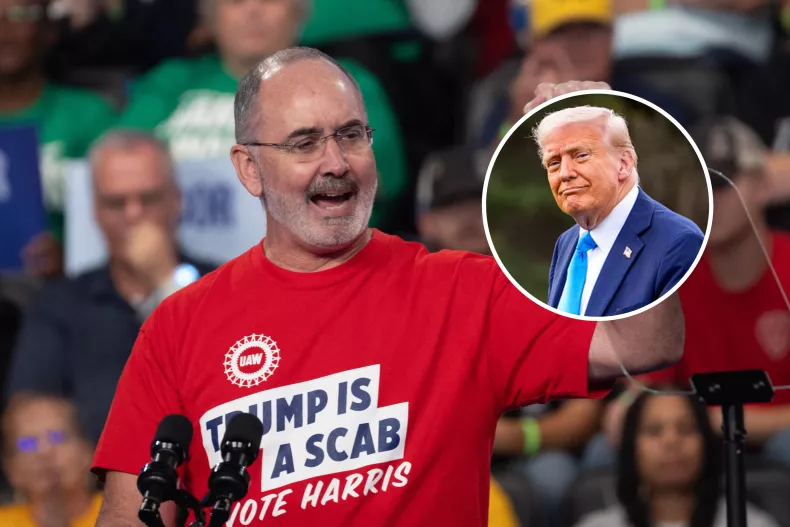Union Leader Who Endorsed Kamala Harris Explains Why He Backs Trump Tariffs

By Jason Lemon
Shawn Fain, president of United Auto Workers (UAW) union, who endorsed then-Vice President Kamala Harris in the 2024 election, explained on Sunday why he has spoken out in favor of President Donald Trump's tariffs.
Newsweek reached out to the White House for comment on Sunday.
Why It Matters
Trump's tariffs targeting adversaries and allies of the United States alike, have faced significant criticism from Democrats, some conservatives and many economists. Critics have said the moves will worsen inflation and raises prices for consumers.
The president and his supporters contend that the tariffs are necessary to bring back manufacturing and production to the U.S., which they believe will create many more American jobs. Fain, despite endorsing then-President Joe Biden and Harris when she took over the Democratic campaign in 2024, has been vocally supportive of Trump's tariffs moves.
Fain's support is also notable due to his staunch criticism of Trump during the 2024 election, when he dubbed the president "a scab." He famously wore a T-shirt at a Harris event reading, "Trump is a scab, vote Harris."
What to Know
Fain sat for an interview on Sunday with CBS News' Face the Nation. During the interview, the prominent union leader who represents more than 400,000 members, was asked about his favorable views of Trump's tariffs.
"All you have to do is look at the history of the United States, especially in auto manufacturing in the last 30 years, with the inception of NAFTA [The North American Free Trade Agreement] and unfair trade laws. We've seen over 90,000 manufacturing facilities leave the United States. We've seen—in the Big Three [General Motors, Stellantis, and Ford Motor Company] alone, in the last 20-plus years, 65 plants have closed," Fain said.
He added: "Tariffs aren't the total solution. Tariffs are a tool in the toolbox to get these companies to do the right thing, and the intent behind it is to bring jobs back here. And, you know, invest in the American workers. The American working-class people have been left behind for decades, and they're sick of it."
The union leader's remarks align with the views of Trump and his economic advisers. While they have said the tariffs may cause some economic disruption in the near term, they believe they will ultimately benefit the country significantly moving forward.
A report by the nonpartisan Tax Foundation think tank released last week said Trump's tariffs "will reduce U.S. GDP [gross domestic product] by 0.4 percent and hours worked by 309,000 full-time equivalent jobs, before accounting for foreign retaliation." Many economists have raised similar concerns, saying the tariffs will raise costs and potentially spur a recession.
Fain previously praised the new tariffs last week in an official UAW statement.
"We applaud the Trump administration for stepping up to end the free trade disaster that has devastated working class communities for decades. Ending the race to the bottom in the auto industry starts with fixing our broken trade deals, and the Trump administration has made history with today's actions," he said.
Shawn Fain
UAW President Shawn Fain speaks during a Kamala Harris rally on October 4, 2024, in Flint, Michigan. Inset: President Donald Trump is seen at the White House on March 28 in Washington, D.C. Scott Olson/Andrew Harnik/Getty Images
What People Are Saying
President Donald Trump to NBC News on Saturday: "I couldn't care less if they [foreign automakers] raise prices, because people are going to start buying American cars."
He added: "I hope they raise their prices, because if they do, people are gonna buy American-made cars. We have plenty."
Stanford University economist Professors Neale Mahoney and Ryan Cumming in a January analysis: "Economists reject tariffs as an effective tool to improve the welfare of Americans or strengthen key industries. In a survey conducted during the first Trump administration, 93 percent of economic experts disagreed that the targeted tariffs on steel and aluminum would improve Americans' welfare, and this was for a targeted policy. Recent research has only solidified economists' opposition to this policy instrument. Studies show that tariffs imposed during the first Trump administration were almost entirely borne by U.S. consumers, with disproportionately large impacts on lower-income households which spend a larger proportion of income on goods made abroad. Indeed, the tariffs did not even help the manufacturing firms they were designed to protect, with higher input costs and retaliatory tariffs outweighing the direct benefits of the tariff policy."
Trump adviser Peter Navarro to Fox News Sunday: "The message is that tariffs are tax cuts, tariffs are jobs, tariffs are national security, tariffs are great for America, tariffs will make America great again."
Read more
Fox host confronts Trump aid with polling showing voters' views on tariffs
Donald Trump reveals why he's "pissed off" at Putin, issues threat
Florida and Wisconsin elections: What to know as Democrats hope to rally
Donald Trump gives update on third term plans
What Happens Next?
New Trump tariffs are slated to take effect on April 2, which the president has dubbed "Liberation Day."
The president aims to launch a range of import taxes, including so-called "reciprocal" tariffs to match the rates charged by other countries. He has specifically discussed targeting allies, including the European Union, South Korea, Brazil and India, among other countries. He has announced 25 percent tariffs targeting automotive imports as well.
Welcome to Billionaire Club Co LLC, your gateway to a brand-new social media experience! Sign up today and dive into over 10,000 fresh daily articles and videos curated just for your enjoyment. Enjoy the ad free experience, unlimited content interactions, and get that coveted blue check verification—all for just $1 a month!
Account Frozen
Your account is frozen. You can still view content but cannot interact with it.
Please go to your settings to update your account status.
Open Profile Settings